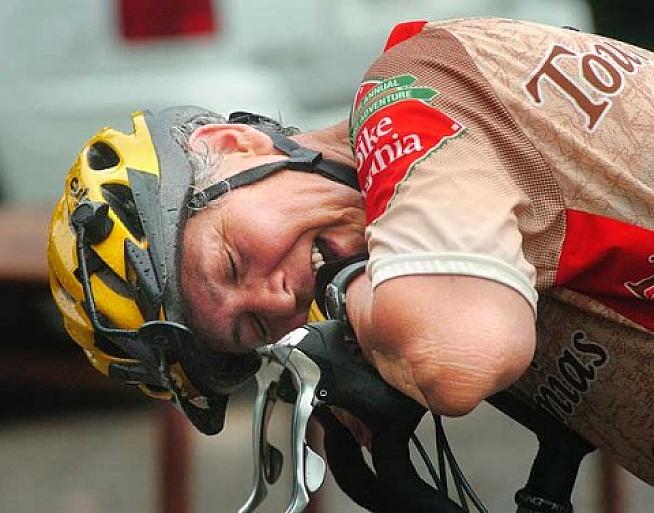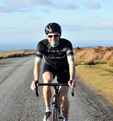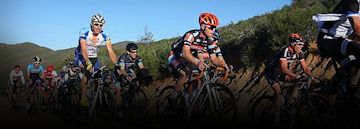OK, it's this time of year again.
I have been harping on about quality training vs quantity for the past few weeks but then the sun comes out, fitness starts to appear, and the whole things starts to unravel in a matter of a couple of weeks. The worst thing is people then mistake the drop in form for not doing enough training and actually up what they are doing at exactly the time that they should be cutting back.
Apart from maintaining general health and well being we don't really need to do a lot training to live our lives. It's not like we have to be on our feet all day hunting for food or running away from attackers! The training process that most of us go through is in many ways subjecting ourselves to totally artificial stimulus in order to prove something in terms of increased performance. A good training programme will lead to positive improvements in fitness (adaptions) to enable a higher level of performance.
However, training only creates the OPPORTUNITY to become fitter. When we train a huge amount of the body's energy is unsurprisingly directed towards coping with the training. Given that we are often pushing ourselves beyond where we have gone before, this process is highly stressful on the body. Continued hard training over weeks and months 'triggers biochemical an neural reactions that take an athlete from fatigue to chronic fatigue and ultimately to the undesirable state of overtraining' (Tudar Bompar)

When athletes drive themselves day after day, week after week, they build up a huge bank of fatigue that then leads to poor performance, low recovery rate, decreased coordination, diminished power and psychological stress. None of this is what you want!
Becoming fit and improving performance is a balance of hard work and rest - two seemingly conflicting priorities.
I see plenty of athletes who do way too much week-on-week. Turbo sessions, road training rides - Rob I am following one of your programmes! And then they slip in that they are doing bootcamp once a week, running twice a week and then maybe ride a horse or something weird like that! There are plenty of six or seven day a week trainers out there. It is bonkers!
Now you know that I love a bit of geeky stuff and I know that it probably sends most of you to sleep but here's something that might help you understand what you are doing to yourself. Each training activity that you do elicits a training stress on your body. If you train with a HR monitor or power meter you can actually get a score for each activity. A hard all out one hour time trial will give you a score of 100. If you don't have a HRM or power meter you are still subjecting your body to the stress, you just can't see it on a screen!
I am training someone for an Ironman. He is swimming, running and cycling every week and on a really hard week his score is around 700. For most amateur athletes with a job this is about the upper limit on training stress for a week. So what is he doing to get to 700?
Swim duration = 2hrs
Run duration = 3hrs
Cycling duration = 5.5hrs
And here is the amazing thing - most of this exercise is done at low intensity and he has two complete rest days per week. He trains hard for three weeks and then CRUCIALLY takes a recovery week when I reduce his training volume down by 40% or more depending on how he is feeling. So every fourth week he is only doing six hours at most.
The first time we did this I could tell that he was nervous as he had been working hard and loved seeing all his graphs point the right way. In the first recovery week the graphs started to point south but his body was adapting, getting stronger, and ready for the new block of training. At the start of the next training week he TOTALLY SMASHED IT. All his metrics started to make new all time highs and he felt GREAT!
I know for a fact that there are a few of you out there who are doing more than 700 points a week and never take a rest and don't look after yourselves properly. For those of you who are new to training I reckon a score of around 400 is much more sensible and manageable.
So here is a practical guide to help you especially if you are new to training:
- Train five days per week max
- Take at least two days off exercise completely per week
- Make 80% of your training low intensity - easy to moderate efforts
- Make 20% of your training hard - really get the HR up for short intense bursts of 1-4 minutes
- Have an easy week every four weeks...and I mean easy!
- Eat enough good food! A 1hr:30min Propello Women's ride will burn roughly 1,000 calories. So eat a carb rich breakfast, bring something good to eat and drink on the ride and then have a carb and protein rich meal asap when you finish.
- Stretch, roller, massage - you know you should!
When I see a rider in a shivering heap in the corner of the bike shop I start to get worried (no names mentioned) and it spurs me to just get on with writing this blog. So come on be good to yourselves and train smart. If all high performance was down to was slogging yourself day after day it would be easy and they would call it football.
If any of you are interested in finding out more about a totally individual training programme that is designed for your level of experience and your lifestyle then please email me. [email protected]
Rob Wakefield is a fully qualified Level 3 Cycling Coach with the Association of British Cycling Coaches and founder of Propello, a cycling focused health and fitness business delivering Performance Training Programmes and Bespoke Coaching to cyclists anywhere in the world.
All cyclists who are looking to improve their speed, endurance or strength will benefit from a structured training programme. Propello Training will improve how your muscles, lungs and heart work and will enable your body to transport and utilise fuel effectively - making you faster and stronger for longer.
Click here to learn more about Propello.
0 Comments







